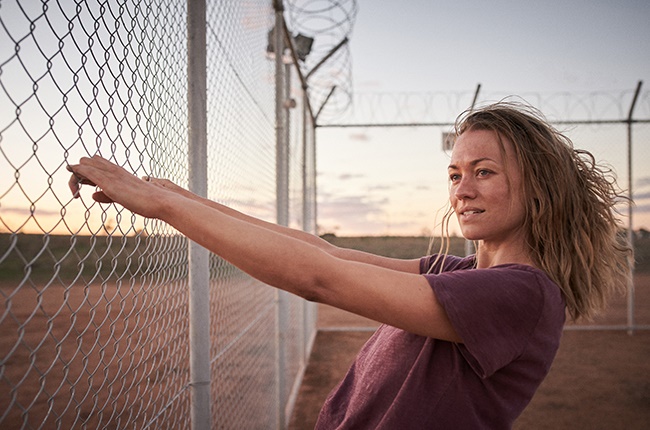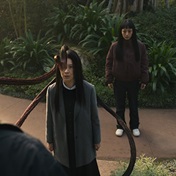
OUR RATING
2/5 Stars
WHAT IT'S ABOUT:
This six-episode limited series tells the story of four strangers whose lives will be forever altered by their association with the (fictional) Barton detention centre for refugees and illegal immigrants in Australia. Cam (Jai Courtney) is a security guard who has just begun a new job working at the Barton detention centre in Australia for refugees and illegal immigrants. Clare (Asher Keddie) is the newly appointed manager of the same facility. Ameer (Fayssal Bazzi), meanwhile, is an Afghanistan refugee who risked everything to try and make a new life for his family in Australia – that horrifically, might have been for nought. And then there is Sofie (Yvonne Strahovski), a fictionalised version of the real-life Australian woman who was detained in a facility just like Barton when a psychotic break had her thinking she was a German who overstayed her visa.
WHAT WE THOUGHT:
In terms of its message and its undeniably honourable intentions, Stateless is an absolute, five-star masterpiece that is entirely beyond reproach. The refugee crisis, no matter how you think it should be handled, is a persistent humanitarian crisis that humanity at large can do a whole lot better to solve.
In terms of acting, production values and direction (especially by Jocelyn Moorhouse in the second half of the series), there's not a whole lot to complain about either. Stateless has already been recognised as one of the most ambitious and immaculately produced Australian TV shows ever.
Unfortunately, both its relevance and basic filmmaking excellence are very badly undermined by some of the most baffling creative choices I've come across in just about forever.
What could have been a brilliant film or three-part limited series turned into an unbearably tedious six-hour-long slog that never seemed to know where and on whom to focus - often obscuring its most compelling aspects with redundant characters, uninteresting sub-plots and some ludicrously simplistic characterisation of some of the supporting characters. Worst of all, the worst episodes by a great distance were the first three.
Had I not needed to see the whole series to review it, I would have given up somewhere in the middle of Episode Two. So how can I possibly recommend a six-part limited series in which the first half is required viewing in terms of setup, but is nothing more than a complete bore?
The biggest problem with the first half of the series is that while we have one character whose story is genuinely compelling and almost immediately devastating (Ameer), the other three characters are total duds who do nothing but take away from Ameer's story. Many have complained about how the series is yet another case in which the story of the "person of colour" (POC) is minimised and although they have a point, I suppose, the truth is that it is much more of a storytelling failure than a political one.
After all, the series is about viewing this real-world problem from several different angles rather than about intentionally minimising the character of the "POC" (gosh, I hate that term). Unfortunately, this will only really work if the other characters are even remotely as compelling as Ameer and if they had enough depth and complexity to warrant the amount of time spent with them.
To be fair, despite the character-arc resolutions being a bit pat and predictable, they do improve as the series goes along, but by the otherwise very moving final episode, it's too little and far too late.
Take Jai Courtney's character, Cam - a solid, working-class guy who hopes to make some decent money and a difference as a guard at the detention facility. As you may expect, things don't exactly go that way and he is drawn into increasingly morally compromised conditions. Courtney is actually very good here after not being very good in a whole bunch of Hollywood films. But you remember that character sketch that I just wrote? That's really kind of it for the character. This is great for a two-hour movie, but his arc and his character become, respectively, very dull and very unlikeable very quickly.
The same is exactly true of Asher Keddie's Clare, who has to be a tough-as-nails manager of a horrific facility while finding a way to not sacrifice her humanity. Again, there's a bunch of scenes of her bemoaning her actions, but she is such an overwhelmingly horrible person throughout much of the series that it becomes increasingly difficult to care. Again, though, Keddie is clearly a fine actress doing fine work.
As for the real-life (-ish) character played by an extraordinarily impressive Yvonne Strahovski, this is where the show really falls flat on its face. The whole idea of a woman who was so shattered by a series of unfortunate events that she disassociated into a completely different person of a completely different nationality and was then wrongfully detained in a refugee centre, represents the very height of storytelling potential – a high-concept slam dunk that should elevate even sub-par filmmaking into something truly special.
Seriously, then, what the hell happened? The filmmaking itself isn't at all sub-par and, again, Strahovski is simply spectacular. Yet her plotline is a total snooze.
The main problem, I believe, is that her story often feels like an afterthought (weirdly, everybody's story in this feels secondary to all the others) that is neither a particularly insightful psychological character study, nor a scathing satire or even serious critique of either the Australian immigration system or the country's (presumable) issue with mental illness. Her character deserves her own film and one that is preferably a blackly comedic satire ala Terry Gilliam's Brazil or Kafka's nightmarish The Trial, rather than the bland and predictably handled, paint-by-numbers drama that it is here.
Instead, creators Tony Ayres, Elise McCredie, and Cate Blanchett (who also appears in front of the camera as a manipulative cult leader alongside the Wire's Dominic West – both great but, ya know... duh) have smushed all these characters together in something that has a tonal consistency that is a real problem.
But tonal consistency isn't the main culprit for Stateless, though. It's actually the rare case where maintaining the same tone with all four characters undermines each of their stories. It's all very sombre and very dramatic, but there's an emotional flatness to the show that is undoubtedly punctuated by plenty of heartbreaking moments, to be sure, but otherwise serves to portray the struggles of the four main characters as basically the same – when they really, really are not.
This is, unfortunately, a problem that even persists into the latter three episodes.
Whether it's the change in director or just the way the show was scripted, the second half of Stateless is a gigantic improvement that finally starts to raise both the tension and the emotional stakes: you would have to be pretty stonehearted not to be moved by some of the events that transpire. Certainly, if you get through it without feeling a growing sense of rage as injustice mounts upon injustice, then you're made of sterner stuff than I am.
Nonetheless, when the series' even-handedness effectively treats all the characters the same on an emotional level, it quickly starts to undermine the overall message and overall feel of the series when the differences between the characters' respective experiences don't just widen but start to fall on opposing sides of the moral spectrum.
And, honestly, as moving as Ameer's story is, there are far more effective ways to take in a sadly countless number of similar stories. There are other films and documentaries and probably TV shows that deal with the gigantic refugee crisis that plagues even the most "civilised" countries. But for my money, it's hard to beat the spectacular 20-minute piece that John Oliver did on the United States' refugee detention facilities (mostly under Trump, but certainly not exclusively). It's a good five hours shorter, it's funnier and the clips he uses to illustrate the real plight of refugees, especially child refugees, are more heartbreaking and more infuriating than anything in Stateless. As, in fact, is the unbridled fury and sadness in Oliver's voice as he wraps up the segment.
I really wish I liked Stateless more. It certainly isn't lacking in things going for it. But I don't, and I can't really recommend it. Do check out that John Oliver clip, though, on YouTube – it's pure dynamite.
WATCH THE TRAILER HERE:




 Publications
Publications
 Partners
Partners











